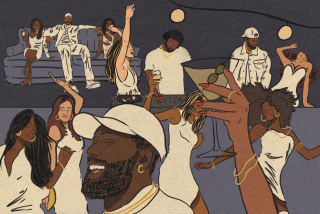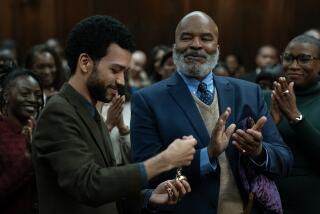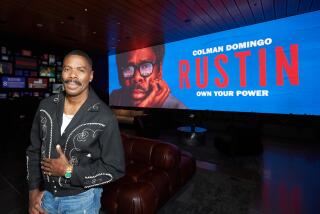Prince gave black kids the license to be themselves, not what society thought they should be
Music in the 1980s was often a segregated experience. In an almost reflexive response to the dominance of funk and disco in the ‘70s — which culminated in mass record burnings — radio was bifurcated between black and white, R&B and rock. MTV was the voice of a generation and, Michael Jackson notwithstanding, almost entirely white.
And then came Prince, who looked like Little Richard after a weeklong stand in a harem. High heels and blousy shirts and a pompadour that wouldn’t quit, always covered in sweat, his mascaraed lashes concealing his doe eyes like boudoir drapes. His music came from the well of funk, but he infused it with an synth-shimmy and Hendrix-ian guitar thunder.
He was outlandish and outsize, pansexual and biracial at a time when black artists simply weren’t, when the aura of black masculinity was both a yoke and a badge of honor. He was a misfit when there weren’t black misfits on a stage that big.
What David Bowie was to white kids who didn’t fit in, Prince was to black kids. He gave young African Americans growing up in Harlem or St. Louis or Watts the license to be who they wanted to be, not what society thought they should be.
When I was growing up in the suburbs of New York City, I and all my friends were deep into the throes of b-boy culture. We formed a breakdancing crew because that’s what you did if you were black in the early ‘80s, despite the fact that none of us could pop, never mind lock.
We had the nameplate belts, the matching track suits, the baseball hats artfully askance. We called ourselves the X-Men, because I was a closet comic book nerd and I sold it to my fellow 14-year-olds as a Malcolm X homage. (Similarly, they didn’t blink when I called myself Mr. Fantastic, despite the fact that Mr. Fantastic was in the Fantastic Four, not the X-Men, and I was profoundly unfantastic.)
We would always travel as a pack, no matter where we went, so when we rolled up to the roller rink on a Friday night en masse, we were ready for any dance threat that might present itself. But none of us was ready for “When Doves Cry” hit the loudspeakers and we saw a bunch of dudes of all shapes, sizes and colors hit the rink in the puffiest of puffy shirts. Proud as peacocks, these fellas were, unafraid of what the knuckleheads standing there in matching hats might say.
At least one of those knuckleheads internalized the idea that you didn’t have to pretend to be something you weren’t. What’s more, you could be all of the things you wanted to be.
If Prince could be a black dude who played rock, who looked as feminine as the women who flocked around him, who could roar into a microphone with the same voice that was quiet as a mouse in speech — well, then, I could be a nerd who loved comics and played Dungeons & Dragons and could be on the football team and be on the AV squad and, yes, eventually cover “Darling Nikki” as the worst lead singer of the best college band you never heard.
Of course, the beautiful ones belong to everyone. But as a young black man, Prince Rogers Nelson was for me.
More to Read
The biggest entertainment stories
Get our big stories about Hollywood, film, television, music, arts, culture and more right in your inbox as soon as they publish.
You may occasionally receive promotional content from the Los Angeles Times.







